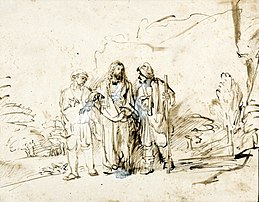
Back Bleib bei uns, denn es will Abend werden, BWV 6 Afrikaans Bleib bei uns, denn es will Abend werden, BWV 6 Catalan Bleib bei uns, denn es will Abend werden (BWV 6) German Bleib bei uns, denn es will Abend werden, BWV 6 Greek Bleib bei uns, denn es will Abend werden, BWV 6 Spanish Bleib bei uns, denn es will Abend werden French Bleib bei uns, denn es will Abend werden Italian Bleib bei uns, denn es will Abend werden Dutch Bleib bei uns, denn es will Abend werden NN Bleib bei uns, denn es will Abend werden NB
| Bleib bei uns, denn es will Abend werden | |
|---|---|
BWV 6 | |
| Church cantata by J. S. Bach | |
 Christ with Two Disciples, by Rembrandt | |
| Occasion | Easter Monday |
| Chorale |
|
| Performed | 2 April 1725: Leipzig |
| Vocal | SATB choir and solo |
| Instrumental |
|
Bleib bei uns, denn es will Abend werden (Stay with us, for evening falls),[1] BWV 6, is a cantata by Johann Sebastian Bach for use in a Lutheran service. He composed it in Leipzig in 1725 for Easter Monday and first performed it on 2 April 1725.
The prescribed readings for the feast day were Peter's sermon from the Acts of the Apostles, and the Road to Emmaus narration from the Gospel of Luke. The text by an anonymous librettist begins with a line from the gospel, and includes as the third movement two stanzas from Philipp Melanchthon's hymn "Ach bleib bei uns, Herr Jesu Christ", one stanza written by Nikolaus Selnecker. The text ends with the second stanza of Martin Luther's hymn "Erhalt uns, Herr, bei deinem Wort". Derived from the gospel scene, the topic is pleading for light in a situation of threatening darkness.
Bach structured the cantata in six movements and scored it for four vocal soloists, a four-part choir and a Baroque instrumental ensemble of oboes, strings and continuo. The extended opening chorus is formed like a French overture and has been compared to Ruht wohl, ihr heiligen Gebeine, the last chorus of Bach's St John Passion.
© MMXXIII Rich X Search. We shall prevail. All rights reserved. Rich X Search